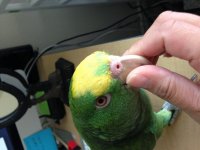henpecked
Active member
I would suggest not getting her wet while on the anti biotics. Are you using Baytril? For a respiratory infection i nubulize Baytril. That and most courses are for 10 days. baytril is so bitter i have issues administering the stuff. Oral with a dropper of the injectable (much more concentrated) followed quickly with something else, or injecting and of course nubulizing. There's no hiding the taste in anything i've found. If you fool them once it won't work the second time you try. The best result i've had is a drop at a time on a favorite (dry food) ,like toast or cracker snack. Good Luck. Holler if you need help.
Last edited:


